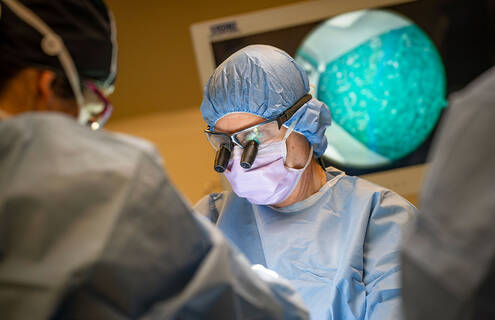
Dartmouth Hitchcock Medical Center cardiologists, orthopaedic surgeons and pathologists are working together on research to identify early signs of amyloidosis, a progressive, multi-system disorder that occurs when amyloid protein builds up in the heart, internal organs, nervous system, musculoskeletal system and digestive tract. The goal is to diagnose the condition years before it results in life-threatening organ failure and other complications.
"Amyloidosis is underdiagnosed, and by the time a patient presents with cardiac symptoms — such as heart failure, cardiomyopathy or atrial fibrillation — the prognosis is very poor, with an average survival of 3-4 years," said Thara S. Ali, MD, Cardiovascular Fellow at Dartmouth Hitchcock Medical Center's Heart and Vascular Center and study co-investigator. "Although an effective treatment for amyloidosis is now available to slow the progression of the disease, it can't reverse the damage that's already been done."
The team at Dartmouth Hitchcock Medical Center is exploring an often-overlooked location — the hand — to find early evidence of amyloidosis and develop screening guidelines for the condition.
"In a relatively large space, such as the heart, it takes years for amyloid deposits to become large enough to cause symptoms," said Vincent D. Pellegrini, Jr., MD, orthopaedic hand surgeon at Dartmouth Hitchcock Medical Center and study co-investigator. "However, in the small spaces of the hand and wrist, amyloid deposits inside the lining of the tendons and nerves may cause symptoms such as trigger finger or carpal tunnel years before cardiac symptoms occur."
Together, the orthopaedic surgery and cardiology teams pioneered a protocol to screen all men over age 50 and women over age 60 who present with symptoms of bilateral carpal tunnel for amyloidosis by performing routine flexor tenosynovial biopsies at the time of carpal tunnel release.
"We believe that the bilaterality of the carpal tunnel presentation is what hints at a systemic problem, and we know men tend to develop amyloidosis earlier than women," said Lance G. Warhold, MD, orthopaedic hand surgeon at Dartmouth Hitchcock Medical Center and study co-investigator. "Through our research, we are working to determine who is at highest risk for amyloidosis and how we can most effectively screen for the condition."
According to Dr. Pellegrini, synovial tissue biopsies for amyloidosis used to be the standard practice during carpal tunnel release procedures performed 40 years ago. But with no effective treatment for amyloidosis at the time, and little patient benefit resulting from early diagnosis, common practice moved away from performing routine synovial tissue biopsies.
But although the researchers emphasized that amyloidosis isn't a new condition, the approval of tafamidis for wild-type and hereditary forms of TTR amyloidosis in 2018 has given cardiologists a "magic bullet" — and the sooner patients start on the medication, the better.
"If a patient has a positive biopsy for amyloid deposits in the wrist, they may have deposits that are detectable in the heart," said Max Biondi, MD, Cardiovascular Fellow at Dartmouth Hitchcock Medical Center's Heart and Vascular Center and study co-investigator. "When the orthopaedic surgeons identify the condition on biopsy, they will make a cardiology referral — and that means our team can perform a complete workup, make a diagnosis and start treatment before cardiac symptoms develop. If there is no evidence of amyloid deposits at the time of our evaluation, we can start surveillance imaging."
"With effective treatment for amyloidosis now available, early diagnosis can save lives — and that's why this research is so important," said Dr. Ali.